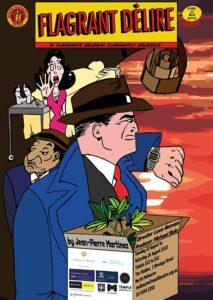
A dive into the mysteries of a police station. Six caricatured and energetically interpreted characters, all united to discover the author of a crime! A farcical black police comedy!
Commissioner Navarin is retiring tonight. But the last day of this cop’s legendary and dubious reputation is going to be more eventful than expected, when he is assigned a final and most confusing case. A corpse in a sauna and a story of plagiarism, all of which seems to lead to a state scandal… Or maybe it’s all just theatre! The more the investigation progresses, the more this quest for the truth tends to show that everything is false in this abracadabrantesque story. Lying truthfully, as we know, is the hallmark of the dramatic arts… as well as politics. This hilarious parody of TV crime shows makes fun of all the flaws in our society, which is often based on imposture, hypocrisy and sometimes even swindling…
The show is the 108th production of Melbourne French Theatre Inc. (MFT) in its 46th year [1977 to 2023] founded by Michael Bula and A. David Gorrie at the University of Melbourne – a record for any French-speaking theatre in the Southern Hemisphere. The show was presented from 22 to 26 August 2023 at The Stables, Meat Market, 2 Wreckyn Street North Melbourne VIC.
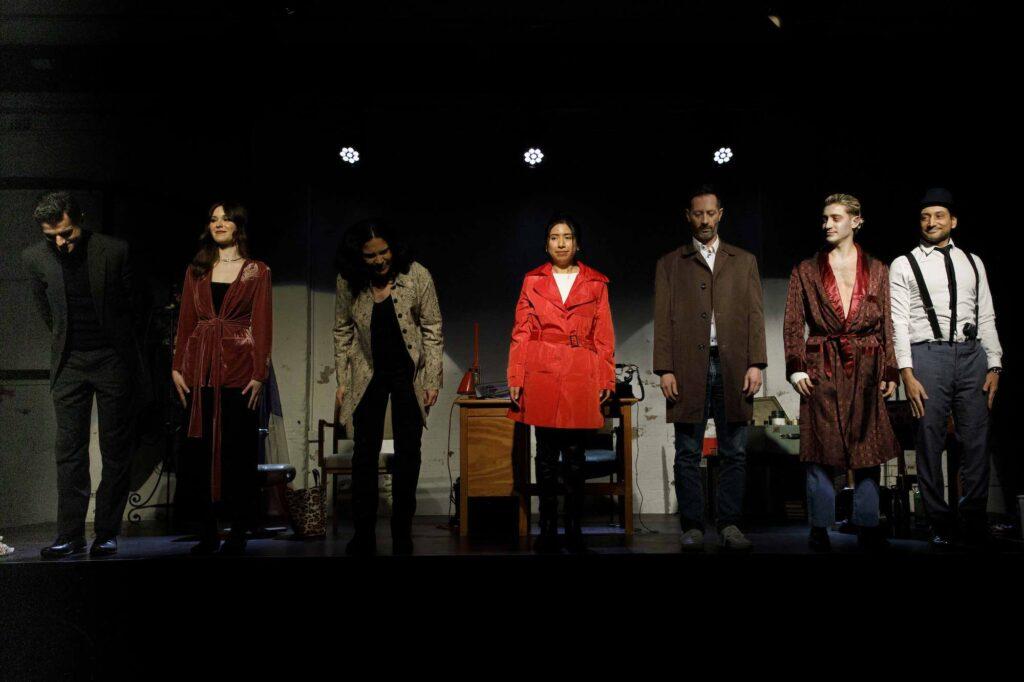
in flagrante delirium / flagrantly delirious
by Jean-Pierre Martinez
Director: Luca Romani
Producer: Michael [Michel] Bula
in French with English sur-titles
Commissioner Navarin – Damien Kenny
Inspector Bordeli – Karim Bouriah-Lopez
Commissioner Ramirez – Paola Villanueva
Chief Commissioner Delatruffe – Ioanna Gagani
Baron de Casteljarnac (Franck) – Hector Lesay
Baronne de Casteljarnac (Margarita) – Olivia Bula
The cadaver – Léo Travé
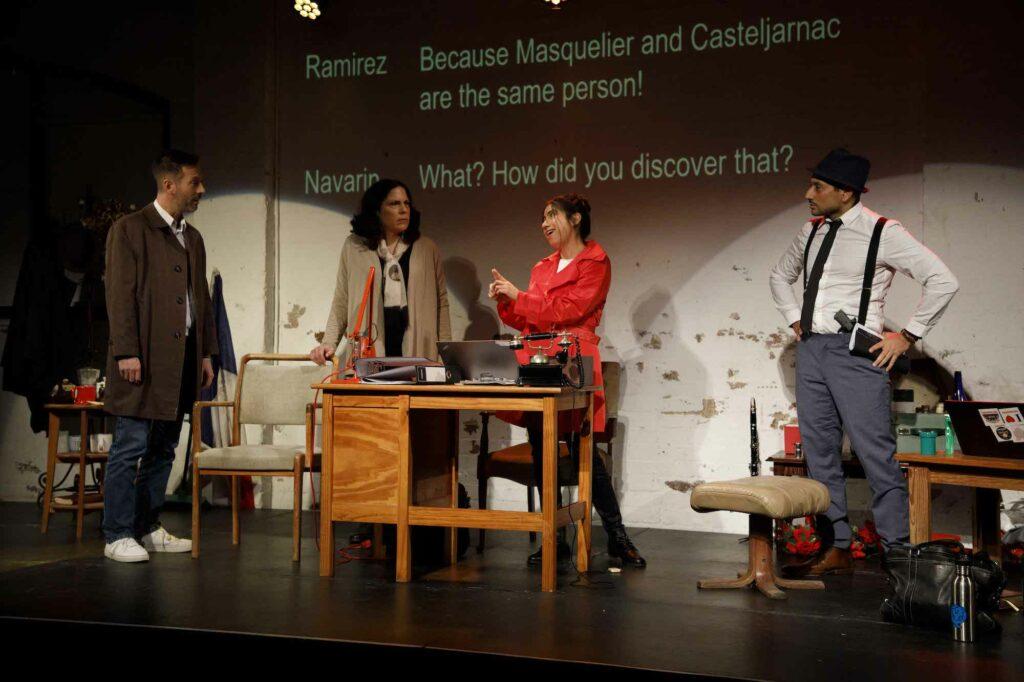
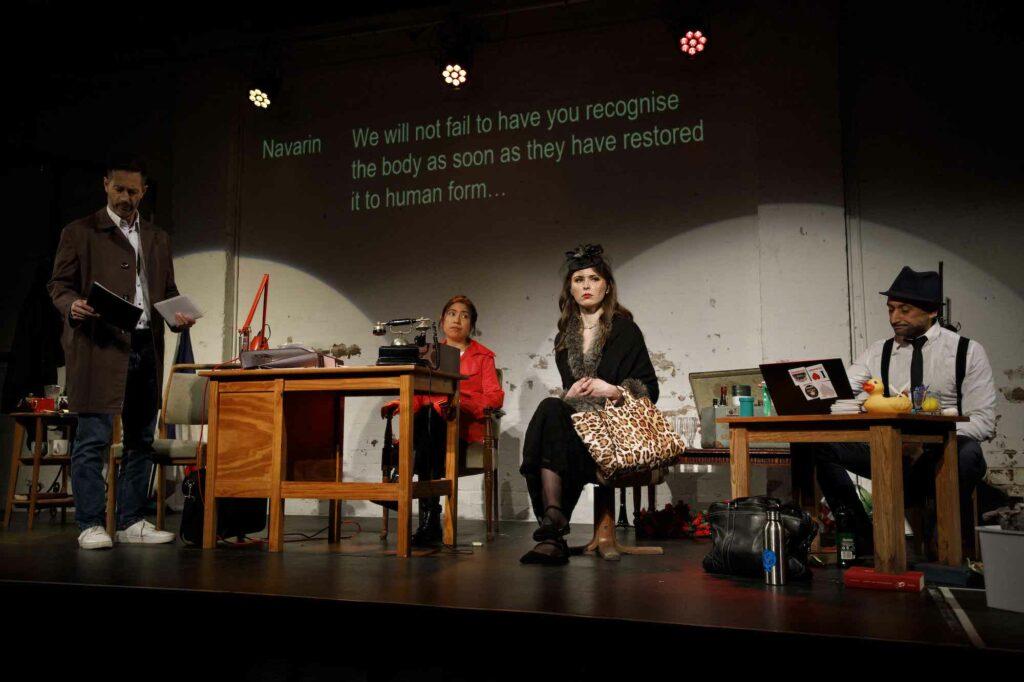
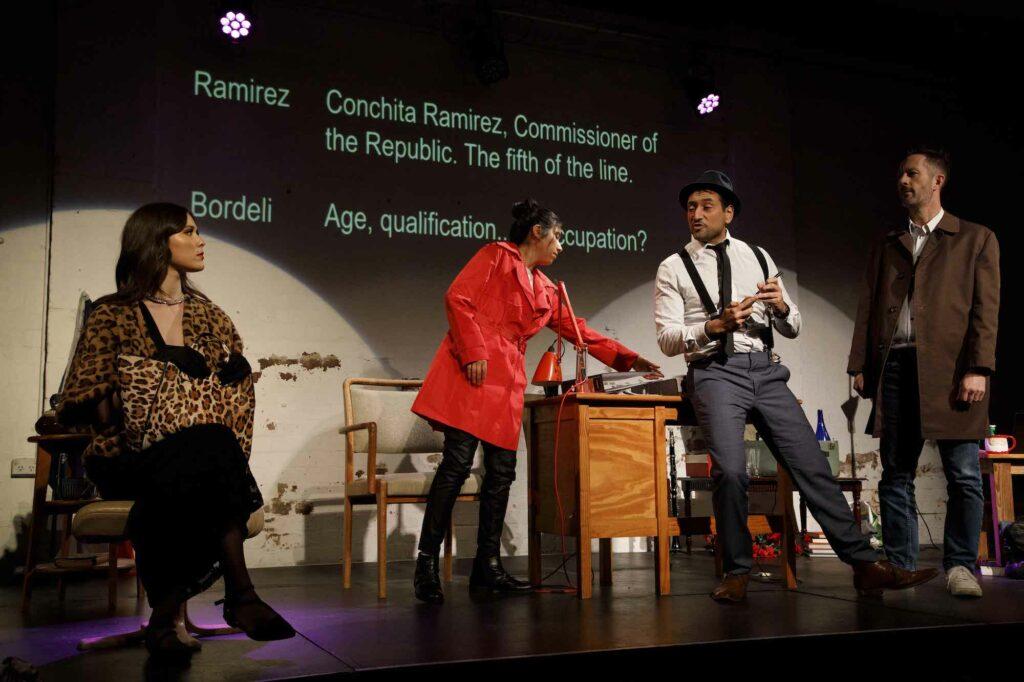
Interview with Jean-Pierre Martinez about the play FLAGRANT DELIRE, performed in Melbourne (Australia) by the Melbourne French Theater
The inextricable link between tragedy and comedy: An interview with playwright Jean-Pierre Martinez.
Martinez’s plays typically focus on the tragi-comedy of everyday situations such as unemployment, awkward dinner parties, visits from in-laws, funerals or hospital emergency rooms. We chatted about the upcoming production, Flagrant Delirium, in anticipation of its debut premiere south of the equator.
The title itself, Flagrant Délire, is a state of conspicuous confusion, the perfect label for a case full of so many twists. As a playwright, what attracted you to write such a text?
It’s always important to choose the right title. In this case, it’s a pun on the expression “Flagrant délit”, a judicial term meaning “caught in the act” (in flagrante delicto), “délit” being replaced by “délire” to induce an absurd dimension à la Ionesco. As for this play, ifs first and foremost a parody of TV detective shows (particularly French ones). I worked as a television scriptwriter for ten years. So, I know this world well. This comedy is a pastiche of the series “Navarro”, which is very well known in France (that’s why the main character is called Navarin). Let’s face it, French TV series are usually very bad, and getting worse all the time. But the series Navarro, at the time (some thirty years ago), was pretty good, because the characters were well characterized and the actors very engaging, while the stories were very much rooted in the specifically French context of the time. Unfortunately, this is no longer the case for most French series today.
Flickering between tragedy and comedy, does the text stand firmly in one State or the other?
For me, tragedy and comedy are inextricably linked. The stories are the same. It’s the point of view that changes. A story about adultery, for example, but also about a crime, can be treated as a drama or a comedy. Humour is a way of looking at life, including and especially in its tragic aspects. Humour is a way of protecting ourselves by playing down tragedy because we can’t avoid it. As far as I’m concerned, there’s no such thing as a good comedy that doesn’t start with a dramatic situation. In any case, that’s the approach taken in almost all my plays.
Comic relief and sharp wit balance each other out on every page. Was this deceptive nature of writing intentional to reveal any particularities?
Comedy is based, among other things, on irony, which consists of saying one thing to express its opposite. Comedy also relies heavily on the unspoken, the implied, and therefore the silences between lines. In comedy writing, the subtext is as important as the text. What’s essential in theatre, it seems to me, is the character.
Text and subtext must therefore work together to characterise the characters and make them empathetic.
What was it about the police station and the hilarious relationships between the incompetence of comic detectives that fits these themes so mil?
Being a parody, it was of course essential that the characters be characterised by their incompetence and immorality. This is another way of making them sympathetic because if audiences love tragedy for its heroes, they also love comedy for its anti-heroes.
Enlightening in its own right, the text accomplishes an attractive level of depth that becomes equally cathartic and profound in its ending. Was this accessibility important to you and your other works?
Here we come back again and again to the very essence of what comedy is for me: humour (especially what we call black humour) consists of laughing at tragic situations so as not to have to cry about them. The world will never really change, because Man will always retain his shortcomings, which Molière was already making fun of (even if it’s Shakespeare I’m discreetly paying tribute to at the end of this piece). They say that humour is the politeness of despair. Indeed, through comedy, and on the pretext of entertainment, I express in my plays the despair I feel for the world and for Man in his inability to improve.
Does the presentation for the first time in Australia to English and French-speaking audiences excite you? I understand our producer Michel bas been in correspondence with you regarding its translation. The production will be elaborately executed with French-speaking actors and English surtitles projected above the stage.
I often say that for me, writing a play and making the text freely available on my website is like a castaway throwing a bottle into the sea in the hope that someone will find it and respond to the call for help. These bottles that I regularly throw into the sea, every day, all over the world, very different people find them, read the text inside, and write to me. People with whom I sometimes enter direct conversation, as was the case with Michel. We didn’t know each other. We met through this text. And we video-chatted for over an hour. I knew nothing about him, but he already knew a lot about me through my texts. It’s also (and perhaps above ail) to bring about these kinds of unexpected encounters that I write. So, you can imagine that bringing the French language and culture to what for us is the other end of the world is both a great pleasure and an honour for me.

Interview with Michel Bula, director of the Melbourne French Theater and Olivia Bula, actress on French SBS radio on the occasion of the casting for the play Flagrant Délire Link (in French)
